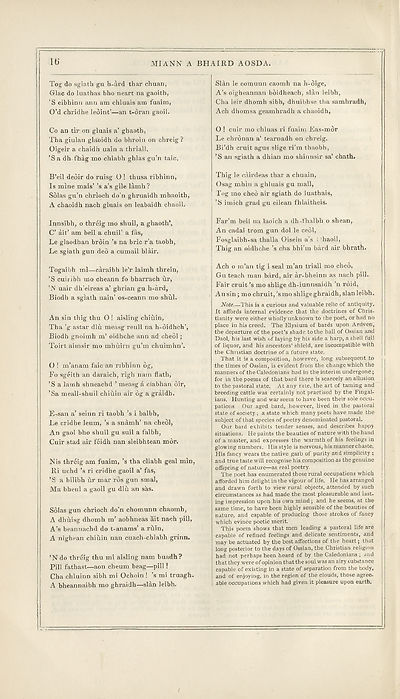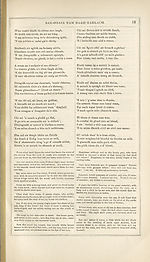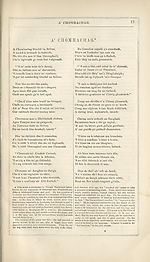Books and other items printed in Gaelic from 1871 to 1900 > Sar-obair nam bard Gaelach, or, The beauties of Gaelic poetry, and lives of the Highland bards
(96) Page 16
Download files
Complete book:
Individual page:
Thumbnail gallery: Grid view | List view

Iti
MI ANN A BHAIRD AOSDA.
Tog do sgiath gu h-ard thar chuan,
Glac do luathas bho neart na gaoith,
’S eibhinn aim am chluais am fuaim,
O’d chridhe leoint’—an t-dran gaoil.
Co an til* on gluais a’ ghaoth,
Tha giulan glaoidh do bhroin on chreig?
Oigeir a chaidh uain a thriall,
’Sa dh fhag mo chiabh ghlas gu’n taic,
B’eil dedir do ruisg O ! thusa ribhinn,
Is mine mais’ ’s a’s gile lamb?
Solas gu’n chrioeh do’n ghruaidh mhaoith,
A chaoidh nach gluais on leabaidh chaoiL
Innsibh, o threig mo shuil, a ghaoth’,
C’ ait’ am beil a chuil’ a fas,
Le glaodhan brdin ’s na brie r’a taobh,
Le sgiath gun ded a cumail blair.
Togaibh mi—caraibh le’r laimh threin,
’S cuii ibh mo cheann fo bharrach ur,
’N uair dh’eireas a’ ghrian gu h-ard,
Biodh a sgiath uain’ os-ceann mo shul.
An sin thig thu O ! aisling chiuin,
Tha ’g astar dlu measg reull na h-didhch’,
Biodh gnoimh m’ oidhche arm ad chedl ;
Toii t aimsir mo mhuirn gu’m chuimhn’.
O ! m’anam faic an ribhinn dg,
Fo sgeith an daraich, righ nam flath,
’S a lamh shneachd ’ measg a ciabhan dir,
’Sa meall-shuil chiuin air dg a graidh.
E-san a’ seinn ri taobh’s i balbh,
Le cridhe leum, ’s a snamh’ na chedl,
An gaol bho shuil gu suil a falbh,
Cuir stad air feidh nan sleibhtean mdr.
Nis threig am fuaim, ’s tha cliabh geal min,
Ri uchd’s ri cridhe gaoil a’ fas,
’S a bilibh ur mar rds gun smal,
Ma bheul a gaoil gu dlu an sas.
Solas gun chrioch do’n chomunn chaomh,
A dhuisg dhomh m’ aobhneas ait nach pill,
A’s bearmachd do t-anams’ a ruin,
A nighean chiiiin nan cuach-chiabh grinn.
’N do threig thu mi aisling nam buadh?
Pill fathast—aon cheum beag—pill!
Cha chluinn sibh mi Ochoin ! ’s mi truagh.
A bheannaibh mo ghraidh—slan leibh.
j
Sian le comunn caomh na h-dige,
A’s oigheannan bdidheaeh, slan leibh,
Cha leir dhomh sibh, dhuibhse tha samhradh,
Ach dhomsa geamhradh a chaoidh,
O ! cuir mo chluas ri fuaim Eas-mdr
Le chrdnan a’ tearnadh on chreig.
Bi’dh eruit agus slige ri’m thaobh,
’S an sgiath a dhian mo shirmsir sa’ chath.
Thig le cairdeas thar a chuain,
Osag mhin a ghluais gu mall,
Tog mo ched air sgiath do luathais,
’S imich grad gu eilean fhlaitheis.
Far’m beil na laoich a dh-fhalbh o shean,
An cadal trom gun dol le cedi,
Fosglaibh-sa thalla Oisein a’s i 'haoil,
Thig an oidhche’s cha bhi’m bard air bhrath.
Ach o m’an tig i seal m’an triall mo ched,
Gu teach man bard, air ar-bheinn as nach pill.
Fair cruit’s mo shlige dh-iunnsaidh ’n rdid,
Ansin; mo chruit/'smo shligeghraidh, slan leibh.
Note.—This is a curious and valuable relic of antiquity.
It affords internal evidence that the doctrines of Chris¬
tianity were either wholly unknown to the poet, or had no
place in his creed. The Elysium of bards upon Ardven,
the departure of the poet’s shade to the hall of Ossian and
Daol, his last wish of laying by his side a harp, a shell full
of liquor, and his ancestors’ shield, are incompatible with
the Christian doctrine of a future state.
That it is a composition, however, long subsequent to i
the times of Ossian, is evident from the change which the |
manners of the Caledonians had in the interim undergone;
for in the poems of that bard there is scarcely an allusion (
to the pastoral state. At any rate, the art of taming and
breeding cattle was certainly not practised by the Fingal- |
ians. Hunting and war seem to have been their sole occu¬
pations Our aged bard, however, lived in the pastoral
state of society ; a state which many poets have made the
subject of that species of poetry denominated pastoral.
Our bard exhibits tender senses, and describes happy
situations. He paints the beauties of nature with the hand
of a master, and expresses the warmth of his feelings in
glowing numbers. His style is nervous, his manner chaste.
His fancy wears the native garb of purity and simplicity :
and true taste will recognise his composition as the genuine
offspring of nature—as real poetry.
The poet has enumerated those rural occupations which
afforded him delight in the vigour of life. He has arranged
and drawn forth to view rural objects, attended by such
circumstances as had made the most pleasurable and last- j
ing impression upon his own mind; and he seems, at the
same time, to have been highly sensible of the beauties of
nature, and capable of producing those strokes of fancy
which evince poetic merit.
This poem shows that men leading a pastoral life are
capable of refined feelings and delicate sentiments, and
may be actuated by the best affections of the heart; that
long posterior to the days of Ossian, the Christian religion
had not perhaps been heard of by the Caledonians ; and
that they were of opinion that the soul was an airy substance
capable of existing in a state of separation from the body,
and of enjoying, in the region of the clouds, those agree¬
able occupations which had given it pleasure upon earth. ;
MI ANN A BHAIRD AOSDA.
Tog do sgiath gu h-ard thar chuan,
Glac do luathas bho neart na gaoith,
’S eibhinn aim am chluais am fuaim,
O’d chridhe leoint’—an t-dran gaoil.
Co an til* on gluais a’ ghaoth,
Tha giulan glaoidh do bhroin on chreig?
Oigeir a chaidh uain a thriall,
’Sa dh fhag mo chiabh ghlas gu’n taic,
B’eil dedir do ruisg O ! thusa ribhinn,
Is mine mais’ ’s a’s gile lamb?
Solas gu’n chrioeh do’n ghruaidh mhaoith,
A chaoidh nach gluais on leabaidh chaoiL
Innsibh, o threig mo shuil, a ghaoth’,
C’ ait’ am beil a chuil’ a fas,
Le glaodhan brdin ’s na brie r’a taobh,
Le sgiath gun ded a cumail blair.
Togaibh mi—caraibh le’r laimh threin,
’S cuii ibh mo cheann fo bharrach ur,
’N uair dh’eireas a’ ghrian gu h-ard,
Biodh a sgiath uain’ os-ceann mo shul.
An sin thig thu O ! aisling chiuin,
Tha ’g astar dlu measg reull na h-didhch’,
Biodh gnoimh m’ oidhche arm ad chedl ;
Toii t aimsir mo mhuirn gu’m chuimhn’.
O ! m’anam faic an ribhinn dg,
Fo sgeith an daraich, righ nam flath,
’S a lamh shneachd ’ measg a ciabhan dir,
’Sa meall-shuil chiuin air dg a graidh.
E-san a’ seinn ri taobh’s i balbh,
Le cridhe leum, ’s a snamh’ na chedl,
An gaol bho shuil gu suil a falbh,
Cuir stad air feidh nan sleibhtean mdr.
Nis threig am fuaim, ’s tha cliabh geal min,
Ri uchd’s ri cridhe gaoil a’ fas,
’S a bilibh ur mar rds gun smal,
Ma bheul a gaoil gu dlu an sas.
Solas gun chrioch do’n chomunn chaomh,
A dhuisg dhomh m’ aobhneas ait nach pill,
A’s bearmachd do t-anams’ a ruin,
A nighean chiiiin nan cuach-chiabh grinn.
’N do threig thu mi aisling nam buadh?
Pill fathast—aon cheum beag—pill!
Cha chluinn sibh mi Ochoin ! ’s mi truagh.
A bheannaibh mo ghraidh—slan leibh.
j
Sian le comunn caomh na h-dige,
A’s oigheannan bdidheaeh, slan leibh,
Cha leir dhomh sibh, dhuibhse tha samhradh,
Ach dhomsa geamhradh a chaoidh,
O ! cuir mo chluas ri fuaim Eas-mdr
Le chrdnan a’ tearnadh on chreig.
Bi’dh eruit agus slige ri’m thaobh,
’S an sgiath a dhian mo shirmsir sa’ chath.
Thig le cairdeas thar a chuain,
Osag mhin a ghluais gu mall,
Tog mo ched air sgiath do luathais,
’S imich grad gu eilean fhlaitheis.
Far’m beil na laoich a dh-fhalbh o shean,
An cadal trom gun dol le cedi,
Fosglaibh-sa thalla Oisein a’s i 'haoil,
Thig an oidhche’s cha bhi’m bard air bhrath.
Ach o m’an tig i seal m’an triall mo ched,
Gu teach man bard, air ar-bheinn as nach pill.
Fair cruit’s mo shlige dh-iunnsaidh ’n rdid,
Ansin; mo chruit/'smo shligeghraidh, slan leibh.
Note.—This is a curious and valuable relic of antiquity.
It affords internal evidence that the doctrines of Chris¬
tianity were either wholly unknown to the poet, or had no
place in his creed. The Elysium of bards upon Ardven,
the departure of the poet’s shade to the hall of Ossian and
Daol, his last wish of laying by his side a harp, a shell full
of liquor, and his ancestors’ shield, are incompatible with
the Christian doctrine of a future state.
That it is a composition, however, long subsequent to i
the times of Ossian, is evident from the change which the |
manners of the Caledonians had in the interim undergone;
for in the poems of that bard there is scarcely an allusion (
to the pastoral state. At any rate, the art of taming and
breeding cattle was certainly not practised by the Fingal- |
ians. Hunting and war seem to have been their sole occu¬
pations Our aged bard, however, lived in the pastoral
state of society ; a state which many poets have made the
subject of that species of poetry denominated pastoral.
Our bard exhibits tender senses, and describes happy
situations. He paints the beauties of nature with the hand
of a master, and expresses the warmth of his feelings in
glowing numbers. His style is nervous, his manner chaste.
His fancy wears the native garb of purity and simplicity :
and true taste will recognise his composition as the genuine
offspring of nature—as real poetry.
The poet has enumerated those rural occupations which
afforded him delight in the vigour of life. He has arranged
and drawn forth to view rural objects, attended by such
circumstances as had made the most pleasurable and last- j
ing impression upon his own mind; and he seems, at the
same time, to have been highly sensible of the beauties of
nature, and capable of producing those strokes of fancy
which evince poetic merit.
This poem shows that men leading a pastoral life are
capable of refined feelings and delicate sentiments, and
may be actuated by the best affections of the heart; that
long posterior to the days of Ossian, the Christian religion
had not perhaps been heard of by the Caledonians ; and
that they were of opinion that the soul was an airy substance
capable of existing in a state of separation from the body,
and of enjoying, in the region of the clouds, those agree¬
able occupations which had given it pleasure upon earth. ;
Set display mode to: Large image | Transcription
Images and transcriptions on this page, including medium image downloads, may be used under the Creative Commons Attribution 4.0 International Licence unless otherwise stated. ![]()
| Permanent URL | https://digital.nls.uk/109810225 |
|---|
| Description | Out-of-copyright books printed in Gaelic between 1631 and 1900. Also some pamphlets and chapbooks. Includes poetry and songs, religious books such as catechisms and hymns, and different editions of the Bible and the Psalms. Also includes the second book ever published in Gaelic in 1631. |
|---|

